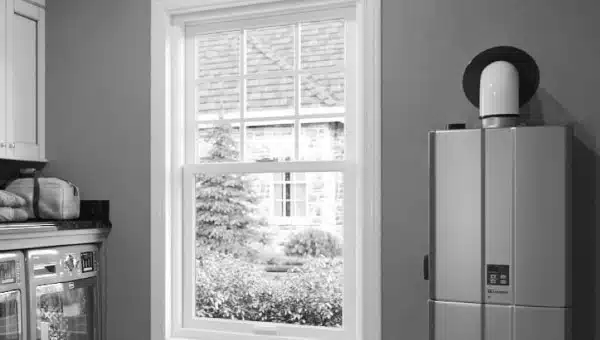Making the switch to a tankless water heater can be a smart move for many homeowners, especially for those who are tired of running out of hot water halfway through a shower. However, cost is a significant factor that can affect your decision.
Understanding the real cost of a tankless water heater requires a detailed breakdown that goes beyond the purchase price. This blog post will walk you through the upfront cost, installation charges, potential energy savings, lifespan and maintenance expenses, and potential rebates and tax incentives associated with tankless water heaters.
Table of Contents
Upfront Costs of Tankless Water Heaters
So, let’s talk dollars and cents. How much will you need to shell out to bring a tankless water heater home? Well, they’re certainly not the cheapest option on the market. When you start shopping around, you’ll find that prices for these modern water heaters can range from $500 to a hefty $2000, depending on the brand and model you choose. And if you’re catering to a larger family or simply love long, hot showers, you might need a high-end model that could cost even more.
Don’t be shocked, though – remember, this price tag only covers the cost of the unit itself. It’s a bit like buying a car without factoring in the cost of the fuel, servicing, and potential breakdowns. But don’t worry, we’ll cover all those additional costs as we go along.
So, while the initial sticker price might seem steep, keep in mind that a tankless water heater is an investment. You’re not just buying a machine; you’re buying efficiency, space-saving design, and the luxury of always having hot water on demand. Just remember, the upfront cost is only the start of the financial journey.
Installation Cost and Factors Affecting It
Hanging the price tag on the installation of a tankless water heater isn’t as straightforward as you might think. It’s like setting up a complex piece of furniture; the cost isn’t just about the materials, it’s about the process too. Installation charges can dance around between $1500 and $2000, which sounds like a handful. The tricky part is, this cost can hike up based on several factors.
You see, if your home needs new gas lines, or an upgraded electrical system, or even tweaked water lines to accommodate this new system, you’ll find those installation costs inching higher. It’s a bit like assembling that fancy bookshelf, only to realize halfway through that you need a special tool or additional screws.
And let’s not forget, labor charges aren’t a one-size-fits-all deal. They can vary depending on where you live or how intricate the installation process is in your home. So, as you prepare to take the tankless water heater plunge, be sure to get a clear-cut estimate from a reputable installer. It’ll be the compass guiding your budget decisions, helping you navigate your way to a wise investment.
Energy Savings and Efficiency
Yes, the upfront costs of a tankless water heater may seem like a tough pill to swallow. But hold onto your wallets, because this is where the scales start to tip in your favor. Tankless water heaters are the star players of the energy efficiency game. Instead of tirelessly heating and reheating a massive tank of water all day, these sleek machines spring into action only when you need hot water.
It’s like having a personal trainer for your energy usage, guiding you away from wasteful habits and into a more efficient routine. This approach can slash your energy consumption by up to a whopping 50%.
Now, what does this mean for you and your budget? Well, depending on your usage, you could see your annual energy bills shrinking by around $100. And like a steady trickle filling a bucket, these yearly savings can slowly but surely start offsetting those high initial costs.
So, even if your bank account is cringing at the thought of the purchase and installation price, remember that it’s not just a one-off transaction. It’s more like a trade-off, where you invest more upfront but reap the rewards in the long run. So, when you think about the cost of a tankless water heater, remember to factor in the cost of energy savings too. It might just be the silver lining you need to justify the initial investment.
Related Content: Water Heater Cost
Lifespan and Maintenance Costs
Alright, let’s now shift our focus to the life expectancy and upkeep costs of tankless water heaters. Now, it’s no secret that everything, even top-notch appliances like these, come with an expiration date. However, with a lifespan extending up to a whopping 20 years, tankless water heaters are like the evergreen trees of their domain, outliving their tank counterparts by almost double the years. Now that’s some serious longevity!
But, like maintaining a classic car or an antique piece of furniture, these long-living heaters require some TLC to stay in tip-top shape. Think of it as an annual check-up to ensure everything is functioning smoothly. This routine care may encompass regular servicing, descaling (much like you’d descale your fancy espresso machine), or swapping out parts from time to time.
While these regular check-ins may feel like a pinch to your wallet now and then, they’re pivotal to keeping your heater running efficiently. Just remember to include these maintenance costs in your overall budgeting plan. After all, they’re part and parcel of owning a tankless water heater and will ensure you get the most out of your investment. It’s a little like making sure you oil that vintage roadster in the garage, not just for the joy of the ride today, but for many joyrides to come.
So, when planning for your tankless water heater, be sure to account for the added years of service and the necessary maintenance costs that come with it. It’s all about seeing the bigger picture and planning for the long haul.
Potential Rebates and Tax Incentives
Here’s where things start to look even rosier for your budget! When you opt for a tankless water heater, not only are you choosing energy efficiency, but you may also be lining yourself up for a financial high-five from the government. Yes, you heard it right! Various federal, state, and local authorities have set up programs to reward homeowners who make environmentally friendly choices, and that includes tankless water heaters. Think of it as a rebate for being a responsible, energy-conscious citizen.
To give you a real-world example, the federal government has been known to offer a tax credit of up to $300 for certain energy-efficient models. Now, that’s a pretty decent slice off your initial investment, right? But don’t stop at just the federal level. Remember to dig deeper into what’s available in your local area as well.
It’s important to remember that these incentives can fluctuate and have certain eligibility criteria. But, fear not! A little research can go a long way in helping you understand what’s available and whether your chosen tankless water heater fits the bill. After all, who wouldn’t love a financial pat on the back for making a smart, energy-saving choice?
FAQs About Tankless Water Heater Cost
How long does it take to install a tankless water heater?
The installation of a tankless water heater typically requires a time frame of 3 to 4 hours. This encompasses the duration dedicated to preparing the site, installing and connecting all necessary components, and conducting tests to ensure proper functionality. Depending on the complexity of the task, more time may be needed to complete any additional tasks or specific requests.
Can I install a gas tankless water heater myself?
It is not recommended to install a gas tankless water heater on your own. Installing gas tankless water heaters requires specialized knowledge and tools. Insufficient installation could lead to perilous situations, such as the occurrence of gas leaks or the presence of fire hazards. In order to guarantee your safety and maximize the lifespan of your new equipment, it is advisable to engage the services of a skilled and knowledgeable plumber.
How long does a tankless water heater last?
Tankless water heaters have a potential lifespan of up to 20 years with consistent maintenance. The durability of the unit is contingent upon its usage frequency, maintenance quality, and installation excellence. Performing routine maintenance, such as removing accumulated sludge and replacing worn-out components, can effectively prolong its lifespan. If a Rinnai tankless water heater is adequately maintained, it should provide reliable hot water for an extended period of time.
Conclusion
As you’re doing your sums and weighing up the cost of a tankless water heater, don’t forget to factor in the potential for rebates and tax incentives. They’re like little gifts of appreciation from the government for helping to make the world a greener place. As they say, every little helps, and these incentives could be just what you need to make the switch to a tankless system more affordable. It’s a win-win situation, both for your pocketbook and for the environment!
Related Content: water heater cost

